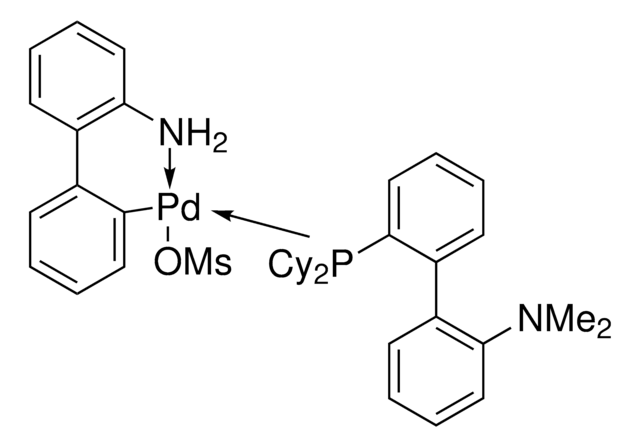Wichtige Dokumente
763403
RuPhos Pd G3
98%
Synonym(e):
(2-Dicyclohexylphosphino-2′,6′-diisopropoxy-1,1′-biphenyl)[2-(2′-amino-1,1′-biphenyl)]palladium(II)methansulfonat, RuPhos-G3-Palladacycle, RuPhos-Pd-G3
About This Item
Empfohlene Produkte
Qualitätsniveau
Assay
98%
Form
solid
Leistungsmerkmale
generation 3
Eignung der Reaktion
core: palladium
reaction type: Buchwald-Hartwig Cross Coupling Reaction
reaction type: Heck Reaction
reaction type: Hiyama Coupling
reaction type: Negishi Coupling
reaction type: Sonogashira Coupling
reaction type: Stille Coupling
reaction type: Suzuki-Miyaura Coupling
reagent type: catalyst
reaction type: Cross Couplings
mp (Schmelzpunkt)
188-196 °C (decomposition)
Funktionelle Gruppe
phosphine
SMILES String
CS(=O)(=O)O[Pd]c1ccccc1-c2ccccc2N.CC(C)Oc3cccc(OC(C)C)c3-c4ccccc4P(C5CCCCC5)C6CCCCC6
InChI
1S/C30H43O2P.C12H10N.CH4O3S.Pd/c1-22(2)31-27-19-13-20-28(32-23(3)4)30(27)26-18-11-12-21-29(26)33(24-14-7-5-8-15-24)25-16-9-6-10-17-25;13-12-9-5-4-8-11(12)10-6-2-1-3-7-10;1-5(2,3)4;/h11-13,18-25H,5-10,14-17H2,1-4H3;1-6,8-9H,13H2;1H3,(H,2,3,4);/q;;;+1/p-1
InChIKey
AXZLIMCJMPNFFU-UHFFFAOYSA-M
Allgemeine Beschreibung
Anwendung
- Palladium-katalysierte Suzuki-Kupplung von 5-p-Toluolsulfonyltetrazolen mit Arylboronsäuren für die Synthese von 1,5-disubstituierten Tetrazolen.
- Suzuki-Miyaura-Katalysator-Transfer-Polykondensation (SCTP) von 3-Alkylthiophenen in Gegenwart von N-Methylimidodiessigsäure(MIDA)-Boronatmonomeren.
- Suzuki-Miyaura-Kreuzkupplung von Aminothiophenen.
Ähnliches Produkt
Signalwort
Warning
H-Sätze
Gefahreneinstufungen
Aquatic Chronic 3 - Eye Irrit. 2 - Skin Irrit. 2 - STOT SE 3
Zielorgane
Respiratory system
Lagerklassenschlüssel
11 - Combustible Solids
WGK
WGK 3
Flammpunkt (°F)
Not applicable
Flammpunkt (°C)
Not applicable
Hier finden Sie alle aktuellen Versionen:
Besitzen Sie dieses Produkt bereits?
In der Dokumentenbibliothek finden Sie die Dokumentation zu den Produkten, die Sie kürzlich erworben haben.
Kunden haben sich ebenfalls angesehen
Unser Team von Wissenschaftlern verfügt über Erfahrung in allen Forschungsbereichen einschließlich Life Science, Materialwissenschaften, chemischer Synthese, Chromatographie, Analytik und vielen mehr..
Setzen Sie sich mit dem technischen Dienst in Verbindung.


















